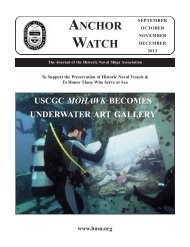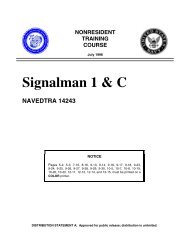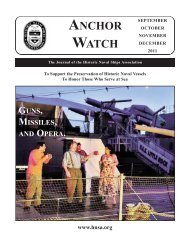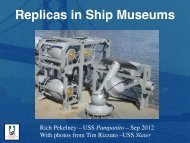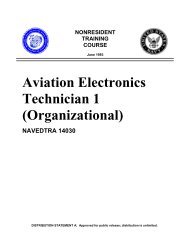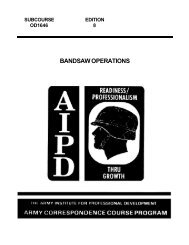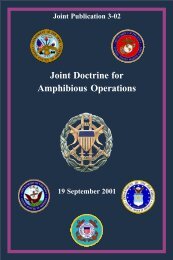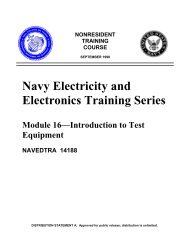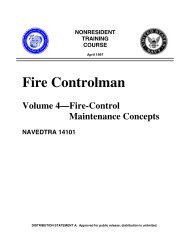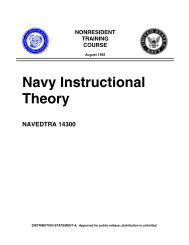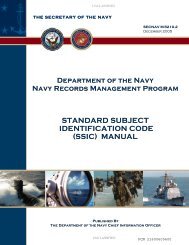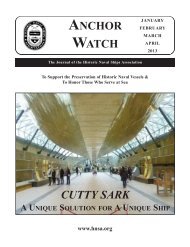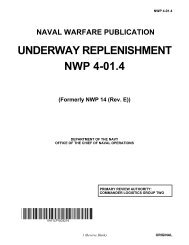- Page 1:
PRINCIPLES OFNAVAL ENGINEERINGPrepa
- Page 4 and 5:
For sale by the Superintendent of D
- Page 6 and 7:
CREDITSThe illustrations indicated
- Page 9:
PART l-THE NAVAL SHIPChapter 1Chapt
- Page 12 and 13:
2PRINCIPLES OF NAVAL ENGINEERINGIn
- Page 14 and 15:
PRINCIPLES OF NAVAL ENGINEERINGor s
- Page 16 and 17:
'PRINCIPLES OF NAVAL ENGINEERINGBOI
- Page 18 and 19:
PRINCIPLES OF NAVAL ENGINEERINGto b
- Page 20 and 21:
PRINCIPLES OF NAVAL ENGINEERINGone
- Page 22 and 23:
PRINCIPLES OF NAVAL ENGINEERINGreco
- Page 24 and 25:
PRINCIPLES OF NAVAL ENGINEERINGweig
- Page 26:
PRINCIPLES OF NAVAL ENGINEERING1;;=
- Page 30 and 31:
PRINCIPLES OF NAVAL ENGINEERINGMACH
- Page 32 and 33:
PRINCIPLES OF NAVAL ENGINEERINGINNE
- Page 34 and 35:
PRINCIPLES OF NAVAL ENGINEERINGBulk
- Page 36 and 37:
LetterPRINCIPLES OF NAVAL ENGINEERI
- Page 38 and 39:
PRINCIPLES OF NAVAL ENGINEERINGdime
- Page 40 and 41:
PRINCIPLES OF NAVAL ENGINEERINGWATE
- Page 42 and 43:
CHAPTERSSTABILITY AND BUOYANCYThis
- Page 44 and 45:
PRINCIPLES OF NAVAL ENGINEERING
- Page 46 and 47:
PRINCIPLES OF NAVAL ENGINEERINGm DI
- Page 48 and 49:
PRINCIPLES OF NAVAL ENGINEERINGa:
- Page 50 and 51:
PRINCIPLES OF NAVAL ENGINEERINGINCL
- Page 52 and 53:
PRINCIPLES OF NAVAL ENGINEERINGTAN
- Page 54 and 55:
PRINCIPLES OF NAVAL ENGINEERINGFigu
- Page 56 and 57:
PRINCIPLES OF NAVAL ENGINEERINGFigu
- Page 58 and 59:
PRINCIPLES OF NAVAL ENGINEERINGa:2p
- Page 60 and 61:
wPRINCIPLES OF NAVAL ENGINEERINGExa
- Page 62 and 63:
xPRINCIPLES OF NAVAL ENGINEERINGenZ
- Page 64 and 65:
PRINCIPLES OF NAVAL ENGINEERINGFREE
- Page 66 and 67:
PRINCIPLES OF NAVAL ENGINEERINGFor
- Page 68 and 69:
PRINCIPLES OF NAVAL ENGINEERINGweig
- Page 70 and 71:
PRINCIPLES OF NAVAL ENGINEERINGDAMA
- Page 72 and 73:
PRINCIPLES OF NAVAL ENGINEERINGcond
- Page 74 and 75:
PRINCIPLES OF NAVAL ENGINEERINGCONT
- Page 76 and 77:
PRINCIPLES OF NAVAL ENGINEERINGCO2
- Page 78 and 79:
PRINCIPLES OF NAVAL ENGINEERINGFigu
- Page 80 and 81:
PRINCIPLES OF NAVAL ENGINEERING^nTi
- Page 82 and 83:
PRINCIPLES OF NAVAL ENGINEERINGrepa
- Page 84 and 85:
PRINCIPLES OF NAVAL ENGINEERINGmeas
- Page 86 and 87:
PRINCIPLES OF NAVAL ENGINEERINGNATO
- Page 88 and 89:
PRINCIPLES OF NAVAL ENGINEERINGFigu
- Page 90 and 91:
PRINCIPLES OF NAVAL ENGINEERINGconc
- Page 93 and 94:
CHAPTERSFUNDAMENTALS OF SHIP PROPUL
- Page 95 and 96:
Chapter 5-FUNDAMENTALS OF SHIP PROP
- Page 97 and 98:
Chapter 5-FUNDAMENTALS OF SHIP PROP
- Page 99 and 100:
Chapter 5- FUNDAMENTALS OF SHIP PRO
- Page 101 and 102:
Chapter 5-FUNDAMENTALS OF SHIP PROP
- Page 103 and 104:
Chapter 5- FUNDAMENTALS OF SHIP PRO
- Page 105 and 106:
Chapter 5-FUNDAMENTALS OF SHIP PROP
- Page 107 and 108:
Chapter 5-FUNDAMENTALS OF SHIP PROP
- Page 109 and 110:
Chapter 5-FUNDAMENTALS OF SHIP PROP
- Page 111 and 112:
Chapter 5- FUNDAMENTALS OF SHIP PRO
- Page 113 and 114:
Chapter 5- FUNDAMENTALS OF SHIP PRO
- Page 115 and 116:
Chapter 5-FUNDAMENTALS OF SHIP PROP
- Page 117 and 118:
Chapter 5- FUNDAMENTALS OF SHIP PRO
- Page 119 and 120:
Chapter 5-FUNDAMENTALS OF SHIP PROP
- Page 121 and 122:
Chapter 6-THEORY OF LUBRICATIONcont
- Page 123 and 124:
Chapter 6-THEORY OF LUBRICATIONThe
- Page 125 and 126:
Chapter 6-THEORY OF LUBRICATIONPURI
- Page 127 and 128:
CHAPTER7PRINCIPLES OF MEASUREMENTMe
- Page 129 and 130:
Chapter 7-PRINCIPLES OF MEASUREMENT
- Page 131 and 132:
Chapter 7-PRINC[PLES OF MEASUREMENT
- Page 133 and 134:
Chapter 7-PRINCIPLES OF MEASUREMENT
- Page 135 and 136:
Chapter 7-PRINCIPLES OF MEASUREMENT
- Page 137 and 138:
•5Chapter 7-PRINCIPLES OF MEASURE
- Page 139 and 140:
Chapter 7-PRINCIPLES OF MEASUREMENT
- Page 141 and 142:
Chapter 7— PRINCIPLES OF MEASUREM
- Page 143 and 144:
Chapter 7-PRINCIPLES OF MEASUREMENT
- Page 145 and 146:
HChapter 7-PRINCIPLES OF MEASUREMEN
- Page 147 and 148:
Chapter 7-PRINCIPLES OF MEASUREMENT
- Page 149 and 150:
Chapter 7-PRINCIPLES OF MEASUREMENT
- Page 151 and 152:
Chapter 7-PRINCIPLES OF MEASUREMENT
- Page 153 and 154:
Chapter 7-PRINCIPLES OF MEASUREMENT
- Page 155 and 156:
Chapter 7-PRINCIPLES OF MEASUREMENT
- Page 157 and 158:
Chapter 7-PRINCIPLES OF MEASUREMENT
- Page 159 and 160:
Chapter 7-PRINCIPLES OF MEASUREMENT
- Page 161 and 162:
Chapter 7-PRINCIPLES OF MEASUREMENT
- Page 163 and 164:
Chapter 7-PRINCIPLES OF MEASUREMENT
- Page 165 and 166:
CHAPTER 8INTRODUCTION TO THERMODYNA
- Page 167 and 168:
Chapter 8 -INTRODUCTION TO THERMODY
- Page 169 and 170:
Chapter 8-INTRODUCTION TO THERMODYN
- Page 171 and 172:
Chapter 8-INTRODUCTION TO THERMODYN
- Page 173 and 174:
VChapter 8-INTRODUCTION TO THERMODY
- Page 175 and 176:
Chapter 8 -INTRODUCTION TO THERMODY
- Page 177 and 178:
Chapter 8- INTRODUCTION TO THERMODY
- Page 179 and 180:
Chapter 8-INTRODUCTION TO THERMODYN
- Page 181 and 182:
Chapter 8 -INTRODUCTION TO THERMODY
- Page 183 and 184:
Chapter 8- INTRODUCTION TO THERMODY
- Page 185 and 186:
Chapter 8- INTRODUCTION TO THERMODY
- Page 187 and 188:
Chapter 8- INTRODUCTION TO THERMODY
- Page 189 and 190:
Chapter 8-INTRODUCTION TO THERMODYN
- Page 191 and 192:
Chapter 8-INTRODUCTION TO THERMODYN
- Page 193 and 194:
Chapter 8 -INTRODUCTION TO THERMODY
- Page 195 and 196:
Chapter S-INTRODUCTION TO THERMODYN
- Page 197 and 198:
Chapter 8-INTRODUCTION TO THERMODYN
- Page 199:
PART lll-THECONVENTIONAL STEAM TURB
- Page 202 and 203:
PRINCIPLES OF NAVAL ENGINEERINGis f
- Page 204 and 205:
is foi:No. 3exam I3A arare u;port a
- Page 206 and 207:
PRINCIPLES OF NAVAL ENGINEERINGFigu
- Page 208 and 209:
—PRINCIPLES OF NAVAL ENGINEERINGt
- Page 210 and 211:
IPRINCIPLES OF NAVAL ENGINEERING00C
- Page 212 and 213:
IPRINCIPLES OF NAVAL ENGINEERINGPIP
- Page 214 and 215:
PRINCIPLES OF NAVAL ENGINEERINGjunc
- Page 216 and 217:
PRINCIPLES OF NAVAL ENGINEERINGsoot
- Page 218 and 219:
; N0.4,——-.PRESfCIPLES OF NAVAL
- Page 220 and 221:
PRINCIPLES OF NAVAL ENGINEERINGMost
- Page 222 and 223:
PRINCIPLES OF NAVAL ENGINEERINGo
- Page 224 and 225:
PRINCIPLES OF NAVAL ENGINEERINGKMCH
- Page 226 and 227:
PRINCIPLES OF NAVAL ENGINEERINGCOoQ
- Page 228 and 229:
1PRINCIPLES OF NAVAL ENGINEERING--T
- Page 230 and 231:
PRINCIPLES OF NAVAL ENGINEERINGBut
- Page 232 and 233:
PRINCIPLES OF NAVAL ENGINEERINGconn
- Page 234 and 235:
PRINCIPLES OF NAVAL ENGINEERINGPRES
- Page 236 and 237:
1PRINCIPLES OF NAVAL ENGINEERINGat
- Page 238 and 239:
PRINCIPLES OF NAVAL ENGINEERINGcros
- Page 240 and 241:
CHAPTER 10PROPULSION BOILERSIn the
- Page 242 and 243:
2PRINCIPLES OF NAVAL ENGINEERINGThe
- Page 244 and 245:
PRINCIPLES OF NAVAL ENGINEERINGCOOL
- Page 246 and 247:
PRINCIPLES OF NAVAL ENGINEERINGbott
- Page 248 and 249:
Q®®^Ti(PRINCIPLES OF NAVAL ENGINE
- Page 250 and 251:
PRINCIPLES OF NAVAL ENGINEERINGREAR
- Page 252 and 253:
|IPRINCIPLES OF NAVAL ENGINEERINGIn
- Page 254 and 255:
PRINCIPLES OF NAVAL ENGINEERINGthe
- Page 256 and 257:
PRINCIPLES OF NAVAL ENGINEERINGDRY
- Page 258 and 259:
PRINCIPLES OF NAVAL ENGINEERINGDoub
- Page 260 and 261:
PRINCIPLES OF NAVAL ENGINEERINGDRUM
- Page 262 and 263:
PRINCIPLES OF NAVAL ENGINEERINGIMTE
- Page 264 and 265:
PRINCIPLES OF NAVAL ENGINEERINGsupe
- Page 266 and 267:
PRINCIPLES OF NAVAL ENGINEERINGECON
- Page 268 and 269:
PRINCIPLES OF NAVAL ENGINEERINGCIRC
- Page 270 and 271:
PRINCIPLES OF NAVAL ENGINEERINGH ;-
- Page 272 and 273:
PRINCIPLES OF NAVAL ENGINEERINGwate
- Page 274 and 275:
PRINCIPLES OF NAVAL ENGINEERINGFigu
- Page 276 and 277:
PRINCIPLES OF NAVAL ENGINEERINGgive
- Page 278 and 279:
PRINCIPLES OF NAVAL ENGINEERINGcan
- Page 280 and 281:
PRINCIPLES OF NAVAL ENGINEERINGthis
- Page 282 and 283:
PRINCIPLES OF NAVAL ENGINEERINGthe
- Page 284 and 285:
PRINCIPLES OF NAVAL ENGINEERINGtake
- Page 286 and 287:
CHAPTER 11BOILER FITTINGS AND CONTR
- Page 288 and 289:
PRINCIPLES OF NAVAL ENGINEERINGconn
- Page 290 and 291:
PRINCIPLES OF NAVAL ENGINEERINGmmm^
- Page 292 and 293:
PRINCIPLES OF NAVAL ENGINEERINGMAIN
- Page 294 and 295:
PRINCIPLES OF NAVAL ENGINEERINGECON
- Page 296 and 297:
PRINCIPLES OF NAVAL ENGINEERINGECON
- Page 298 and 299:
PRINCIPLES OF NAVAL ENGINEERINGthe
- Page 300 and 301:
PRINCIPLES OF NAVAL ENGINEERINGAuxi
- Page 302 and 303:
,SLOTSPRINCIPLES OF NAVAL ENGINEERI
- Page 304 and 305: IPRINCIPLES OF NAVAL ENGINEERINGDRU
- Page 306 and 307: PRINCIPLES OF NAVAL ENGINEERINGMANU
- Page 308 and 309: PRINCIPLES OF NAVAL ENGINEERINGSWIV
- Page 310 and 311: ,PRINCIPLES OF NAVAL ENGINEERING—
- Page 312 and 313: PRINCIPLES OF NAVAL ENGINEERINGI 1S
- Page 314 and 315: PRINCIPLES OF NAVAL ENGINEERINGVENT
- Page 316 and 317: PRINCIPLES OF NAVAL ENGINEERINGCOND
- Page 318 and 319: ^IPRINCIPLES OF NAVAL ENGINEERINGDA
- Page 320 and 321: PRINCIPLES OF NAVAL ENGINEERINGTOP
- Page 322 and 323: -PRINCIPLES OF NAVAL ENGINEERINGfCO
- Page 324 and 325: PRINCIPLES OF NAVAL ENGINEERINGSTEA
- Page 326 and 327: SUPERHEATEROUTLET PRESSUREGAGE:xxxx
- Page 328 and 329: PRINCIPLES OF NAVAL ENGINEERINGflow
- Page 330 and 331: PRINCIPLES OF NAVAL ENGINEERINGtran
- Page 332 and 333: PRINCIPL5S OF NAVAL ENGINEERINGdecr
- Page 334 and 335: PRINCIPLES OF NAVAL ENGINEERINGIn o
- Page 336 and 337: PRINCIPLES OF NAVAL ENGINEERINGblad
- Page 338 and 339: PRINCIPLES OF NAVAL ENGINEERINGFIXE
- Page 340 and 341: PRINCIPLES OF NAVAL ENGINEERINGarra
- Page 342 and 343: 5PRINCIPLES OF NAVAL ENGINEERINGAST
- Page 344 and 345: PRINCIPLES OF NAVAL ENGINEERINGSTEA
- Page 346 and 347: PRINCIPLES OF NAVAL ENGINEERING,S,
- Page 348 and 349: PRINCIPLES OF NAVAL ENGINEERINGSeri
- Page 350 and 351: PRINCIPLES OF NAVAL ENGINEERING'2 H
- Page 352 and 353: PRINCIPLES OF NAVAL ENGINEERINGCONT
- Page 356 and 357: PRINCIPLES OF NAVAL ENGINEERINGcond
- Page 358 and 359: Syitam, SubtytUm, or ComponcnlPRINC
- Page 360 and 361: CHAPTER13CONDENSERS AND OTHER HEAT
- Page 362 and 363: PRINCIPLES OF NAVAL ENGINEERING'REC
- Page 364 and 365: PRINCIPLES OF NAVAL ENGINEERINGAIR
- Page 366 and 367: PRINCIPLES OF NAVAL ENGINEERINGcond
- Page 368 and 369: PRINCIPLES OF NAVAL ENGINEERINGcond
- Page 370 and 371: PRINCIPLES OF NAVAL ENGINEERINGcome
- Page 372 and 373: PRINCIPLES OF NAVAL ENGINEERINGor t
- Page 375 and 376: CHAPTER 14PIPING, FITTINGS, AND VAL
- Page 377 and 378: Chapter 14. -PIPING, FITTINGS, AND
- Page 379 and 380: Chapter 14. -PIPING, FITTINGS, AND
- Page 381 and 382: 'Chapter 14. -PIPING, FITTINGS, AND
- Page 383 and 384: Chapter 14. -PIPING,FITTINGS, AND V
- Page 385 and 386: Chapter 14. -PIPING,FITTINGS, AND V
- Page 387 and 388: Chapter 14. -PIPING, FITTINGS, AND
- Page 389 and 390: ^iChapter 14. -PIPING.FITTINGS, AND
- Page 391 and 392: Chapter 14. -PIPING, FITTINGS, AND
- Page 393 and 394: Chapter 14. -PIPING,FITTINGS, AND V
- Page 395 and 396: Chapter 14. -PIPING,FITTINGS, AND V
- Page 397 and 398: Chapter 14. -PIPING,FITTINGS, AND V
- Page 399 and 400: Chapter 14. -PIPING,FITTINGS, AND V
- Page 401 and 402: Chapter 14. -PIPING, FITTINGS, AND
- Page 403 and 404: CHAPTER 15PUMPS AND FORCED DRAFT BL
- Page 405 and 406:
Chapter 15. -PUMPS AND FORCED DRAFT
- Page 407 and 408:
Chapter 15. -PUMPS AND FORCED DRAFT
- Page 409 and 410:
Chapter 15. -PUMPS AND FORCED DRAFT
- Page 411 and 412:
Chapter 15. -PUMPS AND FORCED DRAFT
- Page 413 and 414:
Chapter 15. -PUMPS AND FORCED DRAFT
- Page 415 and 416:
Chapter 15. -PUMPS AND FORCED DRAFT
- Page 417 and 418:
Chapter 15. -PUMPS AND FORCED DRAFT
- Page 419 and 420:
^Chapter 15. -PUMPS AND FORCED DRAF
- Page 421 and 422:
Chapter 15. -PUMPS AND FORCED DRAFT
- Page 423 and 424:
Chapter 15. -PUMPS AND FORCED DRAFT
- Page 425 and 426:
Sytlem, Subsystem, or Cempon«ntCha
- Page 427 and 428:
Chapter 15. -PUMPS AND FORCED DRAFT
- Page 429 and 430:
integralChapter 15. -PUMPS AND FORC
- Page 431 and 432:
Chapter 15. -PUMPS AND FORCED DRAFT
- Page 433 and 434:
Chapter 15, -PUMPS AND FORCED DRAFT
- Page 435 and 436:
Chapter 16. -AUXILIARY STEAM TURBIN
- Page 437 and 438:
Chapter 16. -AUXmiARY STEAM TURBINE
- Page 439 and 440:
Chapter 16. -AUXILIARY STEAM TURBIN
- Page 441 and 442:
Chapter 16. -AUXILIARY STEAM TURBIN
- Page 443 and 444:
Chapter 16. -AUXILIARY STEAM TURBIN
- Page 445 and 446:
Chapter 16. -AUXILIARY STEAM TURBIN
- Page 447 and 448:
Chapter 16. -AUXILIARY STEAM TURBIN
- Page 449 and 450:
CHAPTER 17COMPRESSED AIR PLANTSComp
- Page 451 and 452:
Chapter 17. -COMPRESSED AIR PLANTSS
- Page 453 and 454:
Chapter 17. -COMPRESSED AIR PLANTSR
- Page 455 and 456:
Chapter 17. -COMPRESSED AIR PLANTSV
- Page 457 and 458:
Chapter 17. -COMPRESSED AIR PLANTS(
- Page 459 and 460:
Chapter 17. -COMPRESSED AIR PLANTSS
- Page 461 and 462:
Chapter 17. -COMPRESSED AIR PLANTSo
- Page 463 and 464:
Chapter 18. -DISTILLING PLANTbiolog
- Page 465 and 466:
Chapter 18. -DISTILLING PLANTSEVAPO
- Page 467 and 468:
'I'Chapter 18. -DISTILLING PLANTSff
- Page 469 and 470:
-Chapter 18. -DISTILLING PLANTSare
- Page 471 and 472:
Chapter 18. -DISTILLING PLANTSconde
- Page 473 and 474:
Chapter 18. -DISTILLING PLANTScbOCS
- Page 475 and 476:
C hapter 18. -DISTILLING PLANTSdist
- Page 477 and 478:
Chapter 18. -DISTILLING PLANTSREGUL
- Page 479 and 480:
[j]Chapter 18. -DISTILLING PLANTSOR
- Page 481 and 482:
Chapter 18. -DISTILLING PLANTSEQUAL
- Page 483 and 484:
CHAPTER 19REFRIGERATION AND AIR CON
- Page 485 and 486:
Chapter 19. -REFRIGERATION AND AIR
- Page 487 and 488:
Chapter 19. -REFRIGERATION AND AIR
- Page 489 and 490:
Chapter 19. -REFRIGERATION AND AIR
- Page 491 and 492:
Chapter 19. -REFRIGERATION AND AIR
- Page 493 and 494:
Chapter 19. -REFRIGERATION AND AIR
- Page 495 and 496:
Chapter 19. -REFRIGERATION AND AIR
- Page 497 and 498:
Chapter 19. -REFRIGERATION AND AIR
- Page 499 and 500:
Chapter 19. -REFRIGERATION AND AIR
- Page 501 and 502:
IChapter 19. -REFRIGERATION AND AIR
- Page 503 and 504:
Chapter 19. -REFRIGERATION AND AIR
- Page 505 and 506:
Chapter 20. -SHIPBOARD ELECTRICAL S
- Page 507 and 508:
Chapter 20. -SHIPBOARD ELECTRICAL S
- Page 509 and 510:
Chapter 20. -SHIPBOARD ELECTRICAL S
- Page 511 and 512:
Chapter 20. -SHIPBOARD ELECTRICAL S
- Page 513 and 514:
GENERATING A VOLTAGEChapter 20. -SH
- Page 515 and 516:
Chapter 20. -SHIPBOARD ELECTRICAL S
- Page 517 and 518:
Chapter 20. -SHIPBOARD ELECTRICAL S
- Page 519 and 520:
Chapter 20. -SHIPBOARD ELECTRICAL S
- Page 521 and 522:
Chapter 20. -SHIPBOARD ELECTRICAL S
- Page 523 and 524:
II XIkGIIHI\^I\Chapter 20. -SHIPBOA
- Page 525 and 526:
Chapter 20. -SHIPBOARD ELECTRICAL S
- Page 527 and 528:
Chapter 20. -SHIPBOARD ELECTRICAL S
- Page 529 and 530:
Chapter 20. -SHIPBOARD ELECTRICAL S
- Page 531 and 532:
Chapter 20. -SHIPBOARD ELECTRICAL S
- Page 533 and 534:
Chapter 21. -OTHER AUXILIARY EQUIPM
- Page 535 and 536:
Chapter 21. -OTHER AUXILIARY EQUIPM
- Page 537 and 538:
iChapter 21. -OTHER AUXILIARY EQUIP
- Page 539 and 540:
Chapter 21. -OTHER AUXILIARY EQUIPM
- Page 541 and 542:
Chapter 21. -OTHER AUXILIARY EQUIPM
- Page 543 and 544:
Chapter 21. -OTHER AUXILIARY EQUIPM
- Page 545 and 546:
Chapter 21. -OTHER AUXILIARY EQUIPM
- Page 547 and 548:
pChapter 21. -OTHER AUXILIARY EQUIP
- Page 549 and 550:
Chapter 21. -OTHER AUXILIARY EQUIPM
- Page 551:
Chapter 21. -OTHER AUXILIARY EQUIPM
- Page 555 and 556:
CHAPTER 22DIESEL AND GASOLINE ENGIN
- Page 557 and 558:
Chapter 22. -DIESEL AND GASOLINE EN
- Page 559 and 560:
Chapter 22. -DIESEL AND GASOLINE EN
- Page 561 and 562:
Chapter 22. -DIESEL AND GASOLINE EN
- Page 563 and 564:
Chapter 22. -DIESEL AND GASOLINE EN
- Page 565 and 566:
Chapter 22. -DIESEL AND GASOLINE EN
- Page 567 and 568:
,AIRChapter 22. -DIESEL AND GASOLIN
- Page 569 and 570:
Chapter 22. -DIESEL AND GASOLINE EN
- Page 571 and 572:
Chapter 22. -DIESEL AND GASOLINE EN
- Page 573 and 574:
Chapter 22. -DIESEL AND GASOLINE EN
- Page 575 and 576:
Chapter 22. -DIESEL AND GASOLINE EN
- Page 577 and 578:
Chapter 22. -DIESEL AND GASOLINE EN
- Page 579 and 580:
Chapter 22. -DIESEL AND GASOLINE EN
- Page 581 and 582:
Chapter 22. -DIESEL AND GASOLINE EN
- Page 583 and 584:
Chapter 22. -DIESEL AND GASOLINE EN
- Page 585 and 586:
Chapter 22. -DIESEL AND GASOLINE EN
- Page 587 and 588:
Chapter 22. -DIESEL AND GASOLINE EN
- Page 589 and 590:
Chapter 22. -DIESEL AND GASOLINE EN
- Page 591 and 592:
Chapter 22. -DIESEL AND GASOLINE EN
- Page 593 and 594:
Chapter 22. -DIESEL AND GASOLINE EN
- Page 595 and 596:
^ 5Chapter 22. -DIESEL AND GASOLINE
- Page 597 and 598:
Chapter 22. -DIESEL AND GASOLINE EN
- Page 599 and 600:
Chapter 22. -DIESEL AND GASOLINE EN
- Page 601 and 602:
Chapter 22. -DIESEL AND GASOLINE EN
- Page 603 and 604:
Chapter 22. -DIESEL AND GASOLINE EN
- Page 605 and 606:
Chapter 22. -DIESEL AND GASOLINE EN
- Page 607 and 608:
CHAPTER 23GAS TURBINESThe gas turbi
- Page 609 and 610:
Chapter 23. -GAS TURBINEGAS -GENERA
- Page 611 and 612:
Chapter 23. -GAS TURBINEGAS PRODUCI
- Page 613 and 614:
Chapter 23. -GAS TURBINECOMBUSTIONC
- Page 615 and 616:
Chapter 23. -GAS TURBINE147.145Figu
- Page 617 and 618:
Chapter 23. -GAS TURBINEand housing
- Page 619 and 620:
Chapter 23. -GAS TURBINEnozzles at
- Page 621 and 622:
Chapter 23. -GAS TURBINECMc•i-ibe
- Page 623 and 624:
Chapter 23. -GAS TURBINEThe startin
- Page 625 and 626:
Chapter 23. -GAS TURBINEmover in th
- Page 627 and 628:
Chapter 24. -NUCLEAR POWER PLANTSCL
- Page 629 and 630:
Chapter 24. -NUCLEAR POWER PLANToma
- Page 631 and 632:
—Chapter 24, -NUCLEAR POWER PLANT
- Page 633 and 634:
Chapter 24. -NUCLEAR POWER PLANTSRE
- Page 635 and 636:
. STEAMChapter 24. -NUCLEAR POWER P
- Page 637 and 638:
Chapter 24. -NUCLEAR POWER PLANTSar
- Page 639 and 640:
Chapter 24. -NUCLEAR POWER PLANTSIn
- Page 641 and 642:
Chapter 25. -NEW DEVELOPMENTS IN NA
- Page 643 and 644:
Chapter 25, -NEW DEVELOPMENTS IN NA
- Page 645 and 646:
Chapter 25. -NEW DEVELOPMENTS IN NA
- Page 647 and 648:
Chapter 25. -NEW DEVELOPMENTS IN NA
- Page 649 and 650:
Chapter 25. -NEW DEVELOPMENTS IN NA
- Page 651 and 652:
Chapter 25. -NEW DEVELOPMENTS IN NA
- Page 653 and 654:
Chapter 25. -NEW DEVELOPMENTS IN NA
- Page 655 and 656:
Chapter 25. -NEW DEVELOPMENTS IN NA
- Page 657 and 658:
Chapter 25. -NEW DEVELOPMENT IN NAV
- Page 659 and 660:
Chapter 25. -NEW DEVELOPMENTS IN NA
- Page 661 and 662:
Chapter 25. -NEW DEVELOPMENTS IN NA
- Page 663 and 664:
Chapter 25. -NEW DEVELOPMENTS IN NA
- Page 665 and 666:
Chapter 25. -NEW DEVELOPMENTS IN NA
- Page 667 and 668:
INDEXComponents and accessories-Con
- Page 669 and 670:
INDEXMain line shaft bearing, 96Mai
- Page 671:
INDEXShipboard electrical systems-C



